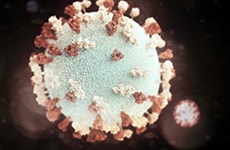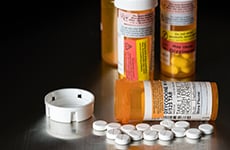Virginia

- State Population: 8,863,619
- Local Health Departments: 119
- Frequent Public Health Emergencies: Environmental Contamination, Severe Weather, Infectious Disease Outbreaks
- Key Emergency Operations Center Activations: 2020: COVID-19 Pandemic
- CDC PHEP Funding:
FY 2022: $15,885,898
FY 2021: $15,481,874
FY 2020: $14,966,098 - Public Health Crisis Response Funding
Mpox 2023 funding: $998,925
COVID-19 2021 funding: $50,920,959
COVID-19 2020 funding: $13,621,612
- Planners: 37
- Other: 34*
*Includes IT specialists, administrative staff, statisticians, and other positions
1 Career Epidemiology Field Officer
1 Preparedness Field Assignee
- Public Health Surveillance and Epidemiologic Investigation
- Public Health Laboratory Testing
- Community Preparedness
- Volunteer Management
- Medical Countermeasure Dispensing and Distribution
In 2020, Katie Kurkjian, a PHEP-funded Career Epidemiology Field Officer in Virginia, established, trained, and led the state health department’s COVID-19 health information team. The team developed and maintained health education materials. They included more than 80 guidance documents, nearly 20 websites, and more than 600 frequently asked questions and answers for the public and the Virginia call-center staff.
As a result, practitioners in the field, healthcare partners, and the public had consistent, up-to-date guidance, resources, and tools. This work ensured state health department leaders, epidemiologists, clinicians, and partners had the most current and relevant information available to support local and state health department surveillance and investigations and to make decisions about cases, clusters, or outbreaks. Overall, the team’s activities enhanced the state’s COVID-19 response through the development of strategic plans, guidance, and tools related to investigation, surveillance, testing, and containment.
In 2020, Kristina Stark, a PHEP-funded preparedness field assignee in Virginia, created a database of COVID-19 testing sites statewide. The assignee identified 120 community-accessible sites, created a map of the sites, and made the information available online. The COVID-19 testing sites saw a 184% increase in the number of COVID-19 tests performed per day after the launch of the website. Testing continued to spike for another month before peaking at a 537% increase since the website launch in April 2021. By June 2021, the website mapped more than 790 fixed location testing sites. Users can filter testing sites by access to free testing, drive-up screening, language services, and pediatric care.

In Virginia, the PHEP program facilitates staffing and exercises so medical countermeasures are distributed quickly to the public during emergencies. In early 2018, a local health department observed an increase in cases of mumps at a university. Because of continuing transmission over the following months, the state health department recommended all students and staff receive a third dose of the measles, mumps, and rubella vaccine. Using plans tested with PHEP-supported exercises, the local health department set up five campus dispensing sites and administered more than 5,000 vaccine doses in April. By July 2018, there were no more cases of mumps on campus.

Since 2007, opioid overdoses in the state of Virginia have increased by 25 percent, and in 2016, the state declared a state of emergency in response to the epidemic. PHEP-funded staff established regional teams comprised of law enforcement, behavioral health experts, emergency coordinators, and public information officers. These teams developed action plans and organized the emergency response at the local level. PHEP-funded staff also obtained permission for pharmacists to dispense naloxone, the antidote for opioid overdose, without a prescription. As a result, affected residents have access to support, counseling, education, and treatment to fight this devastating epidemic.